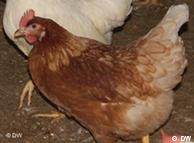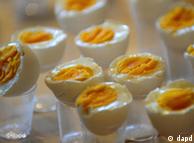German foreign minister fights for political survival
Foreign Minister Guido Westerwelle defended his position as leader of the pro-business Free Democrats (FDP) at the party's annual conference in Stuttgart Thursday, delivering a passionate speech in which he said his party's policies were in part responsible for the recovery of Germany's economy.
"Germany is doing better today than before the last national election," Westerwelle said to applause. "There is no country in the world ... that has come out of the financial crisis as well as Germany."
"We liberals had the courage to do what was right, even if we weren’t congratulated for it every day."
Westerwelle's address was described in some reports as "the speech of his life." The party head has had to fend off calls for his resignation coming from within his own party in recent weeks.
The speech prompted expressions of support from party colleagues. FDP parliamentary group head Birgit Homburger said it put an end to discussion of Westerwelle's future.
"I can't imagine that anyone else will try to continue this debate after this brilliant performance," Homburger said.
The party's secretary general echoed her words, "We shouldn't let other people question our identity," Christian Lindner said, urging his colleagues to stick to the current line.
Lindner warned that the governing coalition, in which the pro-business FDP is partnered with the center-right Christian Democrats, had to succeed, or else the left would get the chance to take charge of the country.
Others were more reserved. Regional FDP leader Herbert Mertin, who had at one time called Westerwelle a millstone around the neck of the party, was skeptical, saying one good speech didn't make everything right.
From 'another planet'
Opposition parties were also unconvinced by Westerwelle's performance.
Green party head Cem Oezdemir told Welt Online that Westerwelle was "clearly living on another planet" and that he appeared to be ignorant of the real problems in the country. He noted that Westerwelle had made no mention of "central challenges" such as climate change and the reform of the economy and the energy sector.
"[The speech] doesn't let him off the hook. The performance was a flop," said top Social Democrat Thomas Oppermann. He said Westerwelle had tried to ignore the debate about his personal role in the falling support for his party.
However, Christian Social Union regional head Hans-Peter Friedrich rated Westerwelle's speech as a "clear expression of his position." His party is part of the ruling coalition with the FDP.
Public support dwindling
Westerwelle has led the pro-business FDP for the last decade, but his popularity has plunged since his party entered government in 2009 as the junior partner in Chancellor Angela Merkel's ruling coalition. Westerwelle said his party was helping the poor
Westerwelle said his party was helping the poor
His position as head of the party is at risk as the FDP faces seven state elections in 2011, including in the traditional party strongholds of Rhineland-Palatinate and Baden-Wuerttemberg. In each state, the FDP could fall below the 5 percent margin needed to enter government.
Westerwelle has led the pro-business FDP for the last decade, but his popularity has plunged since his party entered government in 2009 as the junior partner in Chancellor Angela Merkel's ruling coalition.
 Westerwelle said his party was helping the poor
Westerwelle said his party was helping the poorHis position as head of the party is at risk as the FDP faces seven state elections in 2011, including in the traditional party strongholds of Rhineland-Palatinate and Baden-Wuerttemberg. In each state, the FDP could fall below the 5 percent margin needed to enter government.
In his speech, Westerwelle dismissed concerns about his party's low approval ratings.
"Public opinion is not the measure of our policies," he said. "Our policies are measured by our ideals, our beliefs and our values."
The latest polls showed public support for the FDP at a meager 3 to 5 percent, down from 14.6 percent in the last general election in September 2009.
Criticism from within
As support for the Free Democrats dwindles, Westerwelle has come under attack from members of his own party.
Wolfgang Kubicki, head of the FDP in the state of Schleswig-Holstein, criticized the leader in an interview with news magazine Der Spiegel in December, saying he was "aloof" and remained distant from the FDP's problems. Kubicki and others feel that after 10 years at the top, Westerwelle should move on.
However, in an interview with the weekly Bild am Sonntag newspaper in December, Westerwelle said he refused to abandon his party.
"I will not leave the deck when it is stormy," Westerwelle said.






